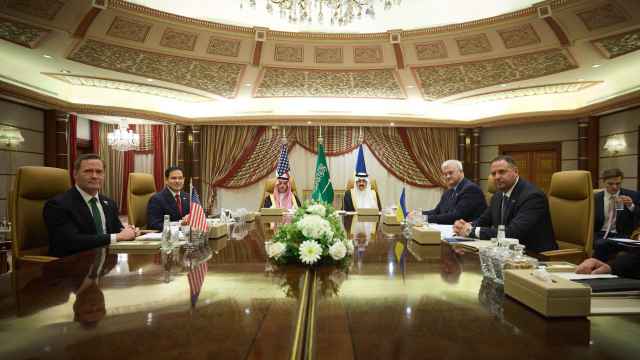The Skolkovo University of Science and Technology (Skoltech) launched classes in Moscow Monday, welcoming 45 new graduate students of different nationalities.
The students joined a group of 20 graduates who studied abroad as part of a Skoltech program that began last year and who have since come back to Russia.
"Help us build the place. If you see something that isn't right, fix it, improve it," Skoltech president Edward Crawley told students. "We're all learning here. You're learning about science, technology and innovation. And we're learning how to build a university. So we need to work together."
Since the 203,000 square meter university campus is yet to be built, the welcoming ceremony took place in the Hypercube, the only functioning building on the 400 hectare construction site of what is to become the Skolkovo Innovation Center, the Russian version of Silicon Valley, on the outskirts of Moscow.
"Without you, students and young people, it would be impossible to create a productive environment at Skolkovo [Innovation Center]. I'm very happy that today you're here to start a new academic year," said Oleg Alekseyev, a vice president of the Skolkovo Foundation and chief operating officer for education and research at the Skolkovo Foundation.
Timur Balbekov, a Russian-American IT graduate from the Massachusetts Institute of Technology (MIT), said he came to Russia to study space technology and start his own company because Skoltech was highly publicized in the U.S.
"I think the government decided to seriously invest and sponsor technology and science development in Russia. I found it attractive and, for the first time, it gave me faith that Russia can develop and lift itself up," Balbekov said.
Another first-year graduate student, Artyom Naumov, studied physics at Moscow State University. He said he applied to Skoltech online after seeing an ad on a social network site.
"I've always been interested in the engineering aspect of science. Russian universities generally focus on theories. Here, you can apply theories to practice. And there is an opportunity to connect with real businesses and companies," Naumov said.
Dmitry Smirnov, a second-year graduate student, said that his green energy and gas turbine projects, which he worked on during his first year at Skoltech, had already attracted possible investors.
"I hope to continue working on my projects and one day start my own company," Smirnov said.
Mohammad Amiral Islam, a graduate of the University of Edinburgh, said he was looking for a university which would combine the theoretical and practical aspects of education.
"Skoltech was a real godsend for me. It embodied what I could previously only dream of," he said, as cited in a Skoltech press release.
Despite recent controversies surrounding the project, Skolkovo continues to enjoy the Kremlin's support. Last month, Economic Development Minister Alexei Ulyukayev said the university would receive 42 billion rubles ($1.3 billion) out of the $15 billion that the Skolkovo Foundation is expected to get from the government and private investors over the next seven years.
Skoltech was founded in 2011 in collaboration with MIT. By 2018, the university hopes to have its own campus, 1,200 students and 200 teaching staff.
Contact the author at g.moukine@imedia.ru
A Message from The Moscow Times:
Dear readers,
We are facing unprecedented challenges. Russia's Prosecutor General's Office has designated The Moscow Times as an "undesirable" organization, criminalizing our work and putting our staff at risk of prosecution. This follows our earlier unjust labeling as a "foreign agent."
These actions are direct attempts to silence independent journalism in Russia. The authorities claim our work "discredits the decisions of the Russian leadership." We see things differently: we strive to provide accurate, unbiased reporting on Russia.
We, the journalists of The Moscow Times, refuse to be silenced. But to continue our work, we need your help.
Your support, no matter how small, makes a world of difference. If you can, please support us monthly starting from just $2. It's quick to set up, and every contribution makes a significant impact.
By supporting The Moscow Times, you're defending open, independent journalism in the face of repression. Thank you for standing with us.
Remind me later.





